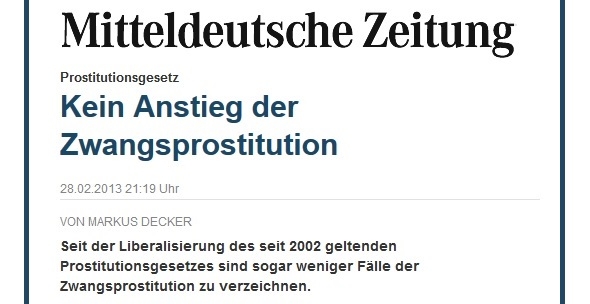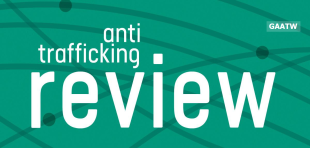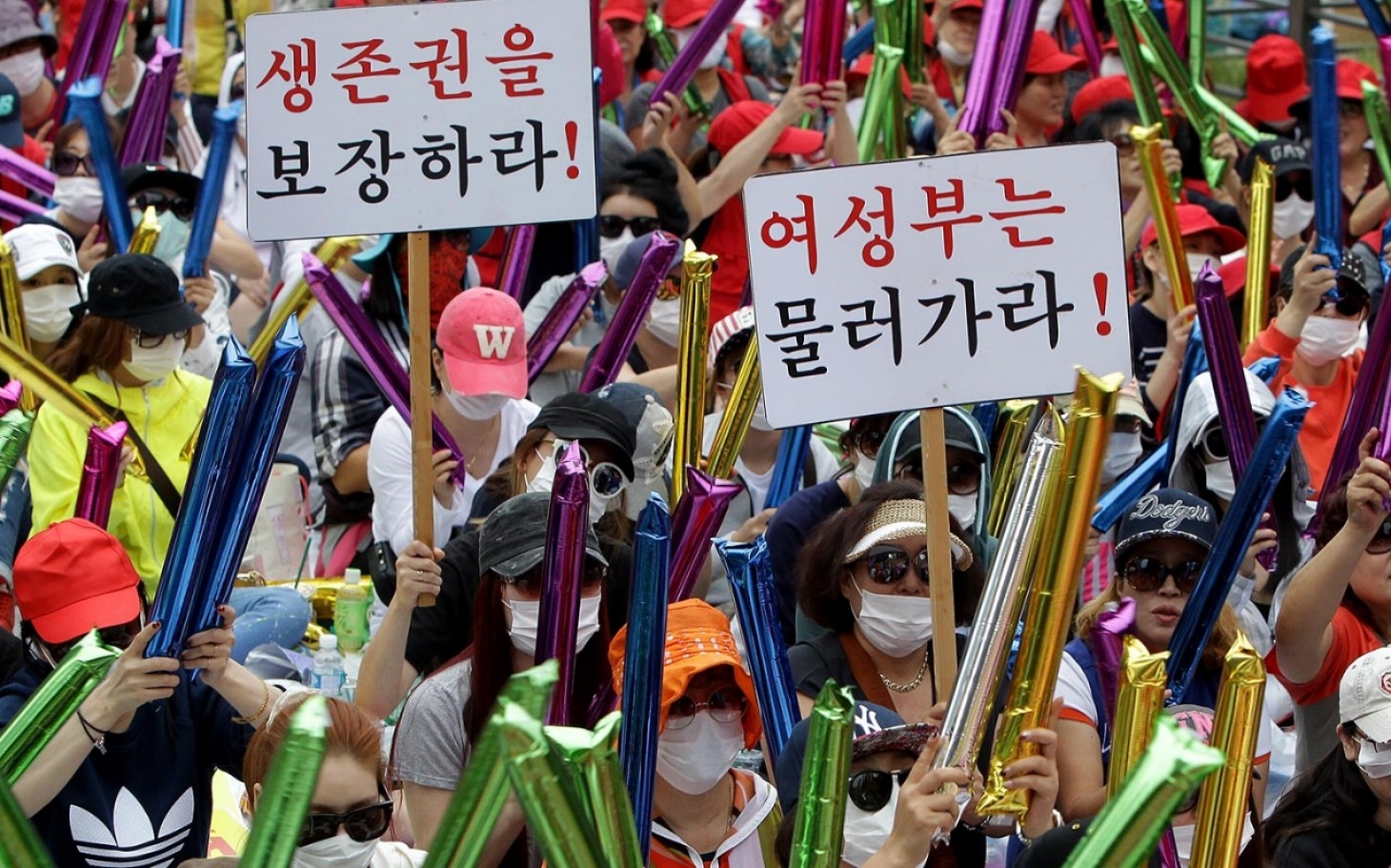Prostitution Law: No Increase in Forced Prostitution
 “The assumption that liberal prostitution laws lead to an increase in human trafficking is refuted. On the contrary: ever since the liberalisation, there has been more police activity but notwithstanding, there are significantly less suspects, convicts and victims. That’s rather an indicator that the disentanglement of prostitution from criminal environments is increasingly successful.” – Volker Beck, MP
“The assumption that liberal prostitution laws lead to an increase in human trafficking is refuted. On the contrary: ever since the liberalisation, there has been more police activity but notwithstanding, there are significantly less suspects, convicts and victims. That’s rather an indicator that the disentanglement of prostitution from criminal environments is increasingly successful.” – Volker Beck, MP
In early February, the German Greens submitted an enquiry to the federal government, concerning the impact of the German prostitution law on the trend of human trafficking. On February 22nd, the government issued a reply. The following are translated quotes. Below, you can download the enquiry and the answer of the federal government as pdf files. All documents are available in German only.
“In the year 2000, the National Situation Report about Trafficking in Human Beings registered altogether 926 victims. In the year 2011, there were 640. This equates to a decrease of just under 31 per cent. If one compares the figures of registered victims in 2003 [a year after the prostitution law was passed] and 2011, one sees a certifiable decline of just above 48 per cent.” It should be noted that this is despite “greater activities by the police”, a fact Volker Beck referred to in the above quote. [Page 7-8]
From a quantitative viewpoint, the risk potential of human trafficking for the purpose of sexual exploitation in Germany is “limited”. [Page 8]
“The annually compiled National Situation Report by the Federal Criminal Police Office (BKA) shows no significant increase of victims that would indicate an expansion of the phenomenon as a result of the prostitution law taking effect.” [Page 10]
The reply by the German government thus refutes the claim by Neumayer, Cho and Dreher that legalised prostitution increases human trafficking.
Please click here for the enquiry by Volker Beck (Cologne), Monika Lazar, Ekin Deligöz, Britta Haßelmann, Ingrid Hönlinger, Memet Kilic, Dr. Konstantin von Notz, Tabea Rößner, Arfst Wagner (Schleswig) and the faction Bündnis 90/Die Grünen.
Please click here for the reply by the federal government. I would like to express my sincere gratitude to the staff at Volker Beck’s office for immediately supplying me with this document.
You can view the full text of the German prostitution law (ProstG) on the website of the Federal Ministry of Family Affairs, Senior Citizens, Women and Youth.
Please click on the image below to access an article about the enquiry by the Central German Newspaper (English Translation via Google Translate).
Related Posts
“We still know very little.” – 10 Years Prostitution Law (ProstG) in Germany
Does the Legalisation of Sex Work increase Trafficking?
Less cases of forced prostitution registered since the liberalisation of the prostitution law in 2002









Pingback: The Week in Links–March 1st
Reblogged this on Harlots Parlour and commented:
Looks like official statistics from the Germans Government dispelled the myth that liberalisation of sexwork increases coercion and trafficking in our work place. Seems the complete opposite is true as we all know should be the case.
March 2, 2013 at 10:17 am
I think what Mr Beck points out and what is mentioned in the government’s reply, too, is particularly relevant: there has been more police activity but there were less suspects, convicts and victims. Often, when an increase in trafficking cases is blamed on the liberalisation of sex work/prostitution laws, the fact that increased police activity naturally leads to increased case figures is disregarded by opponents of such laws in order to support their arguments. In the German case, they have no such luck.
Note that Mr Beck also states that “every victim of human trafficking or forced prostitution is one too many” and that he suggests more effective protection of victims by making it easier to grant them residential status in Germany. Now there’s a man who makes sense.
March 2, 2013 at 10:30 am
Helper Industry Germany
40 Opferberatungsstellen berieten 202 Opfer im Jahr 2011 (5 Opfer je Beratungsstelle) !!!
Deren Bundesverband der KOK sagt, es gebe keine bundesweiten Zahlen, weil unterschiedlich gezählt werde, je nachdem wie der jeweilige Zuwendungsgeldgeber das vorschreibe.
Von den jährlich ca. 600 Menschenhandelsopfern wurden auch nur ca. 25-35% (1/4-1/3) von den Beratungsstellen betreut.
Den Opfern gegenüber stehen ca. 700 Tatverdächtige pro Jahr (BKA-Zahl), aber tatsächlich abgeurteilt UND verurteilt werden nur ca. 120-150 pro Jahr (Zahl vom Statistischen Bundesamt), also 17% der BKA-Zahlen, die man viel häufiger in den Medien lesen kann.
Vgl.: http://www.bit.ly/bkazahlen
Nur ca. 50 Opfer pro Jahr sind undokumentierte Migrant_innen aus Drittstaaten (d.h. besonders ausbeutungsgefährdet, weil aus Nicht-EU-Staaten, in denen es keine Freizügigkeitsregelungen für Reise und Arbeit gibt). Dennoch will die Bundesregierung keine besonderen Schutzregeln an diese Gruppe als Privilegien vergeben.
Zwischen Hilfsvereinen und Polizei der Länder gibt es zahlreiche Kooperationsvereinbarungen inkl. Fortbildungen.
Angestiegen waren die Opferzahlen zeitweise nach Einführung der Menschenhandelsparagraphen §232 seit 2005, weil in einigen Bundesländern insbesondere 18-21jährige als Opfer von Menschenhandel erfasst wurden, was volljährige Ausländer_innen (Sexworker-Migrantinnen) vmtl. oftmals nicht wußten. (Die sog. “ausländerspezifische Unwissenheit” führt somit per neuem vorgeblichen Schutz-Gesetz direkt in den Opferstatus. *facepalm*)
March 2, 2013 at 8:58 pm
Reblogged this on respectsexwork.
March 3, 2013 at 8:32 pm
Pingback: That Was the Week That Was (#310) | The Honest Courtesan
Pingback: New public consultation process on the future direction of prostitution legislation - Page 36